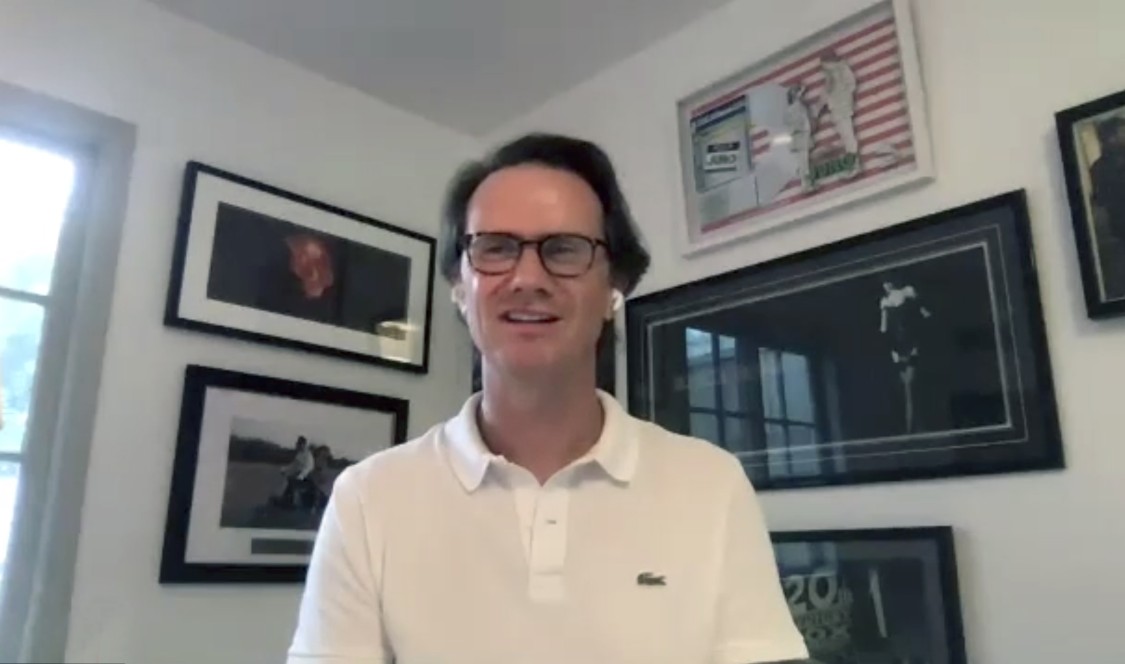Chairman of Walt Disney Television Peter Rice began his relationship with CMC the same summer that he got his professional jumpstart as an intern in the entertainment industry.
Rice told the virtual Athenaeum audience on Sept. 23 that he has always had a warm feeling about CMC and its students. When he was a student at the University of Nottingham in the U.K., he ventured on his own to Los Angeles to work a summer job at 20th Century Fox in their film division. He needed to quickly find a place to live and ended up rooming with two “fantastic” CMC students in Brentwood, close to the movie studio where Rice would launch his 30-year career in the entertainment industry.
Throughout his subsequent three decades working in film and television, Rice has overseen a wide range of award-winning, crowd-pleasing movies and TV series, including “Slumdog Millionaire,” “X-Men,” “Modern Family,” and “Atlanta.” Rice spent the bulk of his professional life working in various divisions at Fox before joining The Walt Disney Company after Disney acquired 21st Century Fox in 2019.
During his Ath talk and interview with student fellows Nandeeni Patel ’21 and Chris Agard ’21, Rice offered further details about his career trajectory, as well as his thoughts on adapting the industry during the COVID-19 pandemic, as well as the evolving media landscape.
“I never thought I would have a career in film,” Rice said. “I knew I wanted to work in the media business in some way, but I couldn’t see a path to working in the film business. If I stayed in London, I would have worked for an ad agency or become a journalist. It was eye-opening to come to Los Angeles and to Fox. I encourage students to think expansively when you’re doing your own internships.”
Rice parlayed his internship into a full-time job at Fox, where he worked in independent film acquisition, establishing connections with filmmakers-on-the-rise, including Baz Luhrmann and Danny Boyle. “I started relationships with these directors, developing screenplays,” he said.
The success of Luhrmann’s modern take on “Romeo and Juliet” starring Claire Danes and Leonardo DiCaprio, which Rice helped to shepherd in 1996, was according to Rice, “a boon for my career.”
From there, Rice described how for 10 years he supervised movies such as the musical “Moulin Rouge” (also with Luhrmann) and blockbuster action film “Independence Day” before earning the opportunity to run Fox Searchlight, where he produced low-budget, critically acclaimed films such as “Juno” and “Sideways.”
At that point in his career, Rice said that working in television was not on his radar, but just before “Slumdog Millionaire” won the Oscar for Best Picture, Rice was offered the chance to run Fox’s broadcast TV side.
“While working in television is incredibly different than film, the creative part is very similar,” he said. “We try to attract the best people to work for us. You have to try to create an environment for talent that really is better than your competitors. The marketplace will determine that we all pay the same amount of money for creative talent, so you have to provide an environment where they can do their best work, and be the most successful.”
In 2017, Rice was tapped to become president of 21st Century Fox, the leadership role he held when Disney acquired Fox’s assets. Now as Disney’s top TV executive, Rice has adapted to a new corporate culture, as well as a new set of responsibilities, which include running ABC News—“I’d never worked in news before”—and overseeing children’s content. “There’s no better place to learn the kids’ business than Disney,” he said.
After Patel and Agard interviewed Rice, he took questions from students and alumni who were in the virtual audience. He was asked how Disney productions were affected by the COVID-19 pandemic.
“We all went home on March 13,” he recalled. “But we had to keep the networks up and running. How to make TV in the time of COVID is something we couldn’t have planned for. Yet, we make 50 animated TV shows and we haven’t missed an episode. All of the animators are at home, all over the world, animating and sending their files to us. And, to keep the news division going, we had to set up hundreds of studios in people’s houses!”
Aside from animation and news, almost all other Disney productions were shut down, Rice said. One exception was the romantic comedy miniseries “Love in the Time of Corona,” produced entirely virtually in late June, and aired on the Freeform cable channel in August. Rice estimated that Disney is currently back in production on about 50 shows and “by Thanksgiving it will be 100 or more. We have lots of shows shooting in Vancouver,” he said. “And, we are doing a tremendous level of COVID testing, three times a week if you’re on set.”
Innovation has been key to getting productions back on track, he continued. “For example, we can’t shoot crowd scenes, so we’re creating those with visual effects. And there is lots of innovation in how we tell stories. Do we include COVID into our stories? Or do we pretend it didn’t happen?”
When Rice was asked by a CMC student if he sees the industry shifting its creative output to include more bite-sized content due to the influence of social media, he responded, “Yes, but how? Technology always changes storytelling. TV was always episodic. A single story would be told in one episode. You had to wait a week for the next one. Now because of streaming capabilities, a TV story can play out 70 hours over seven years. While ways of storytelling will continue to evolve, there will always be a human desire to escape into a great story. That desire has existed since people sat around the campfire telling each other stories.”
—Anne Bergman

